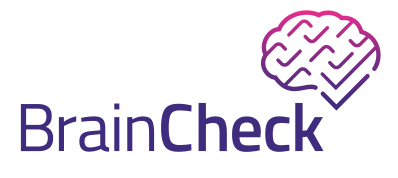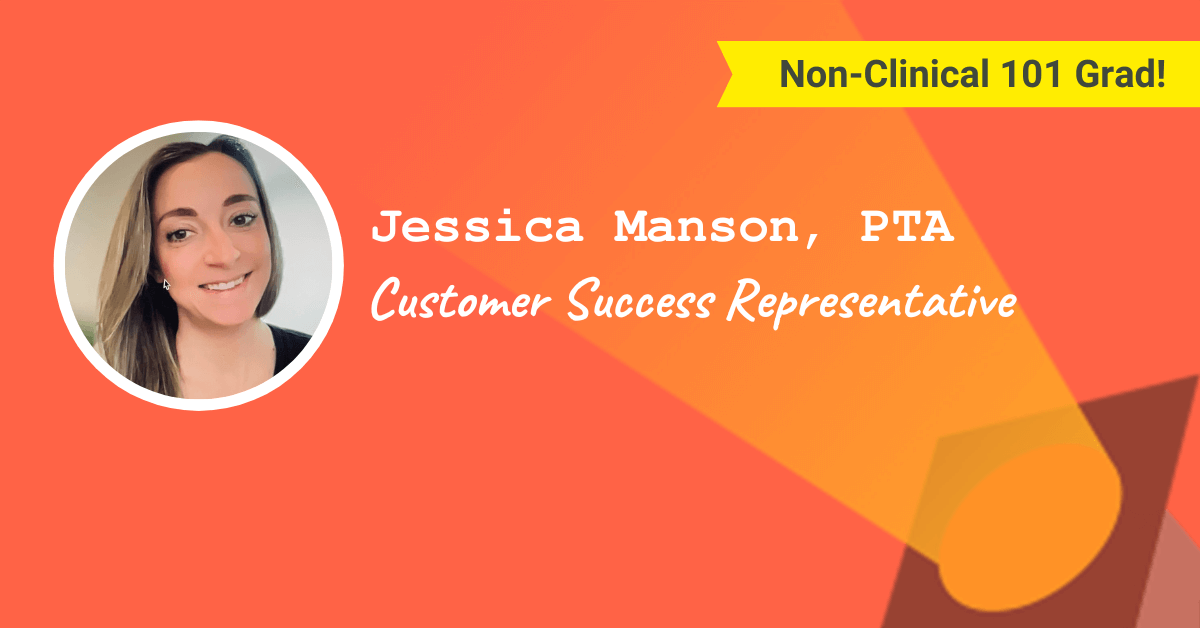Today we spotlight Jessica Manson, a physical therapist assistant and Non-Clinical 101 alumnus who is now thriving as a customer success representative for BrainCheck!
This post may contain affiliate links or codes. This won’t increase your cost, but it helps keep TNCPT alive, and free of annoying ads! Thank you for your support. 🙂
What is your full name, title, and company name for your current, primary role?
Jessica Manson, PTA – Customer Success Representative at BrainCheck, Inc.

Where are you located?
Cypress, Texas
Where did you go to PTA school, and what year did you graduate?
SUNY Orange, 2018
What did you do when you first finished school, and for how long?
When I first finished school, I was hired at a SNF and worked in this setting on and off for four years.
Please refrain from contacting our spotlight participants on social media. There are thousands of readers just like you out there. 🙂 Please ask your questions in the comments on this blog post.
If you’re a Non-Clinical 101 student, you can network with many of our spotlight participants in the alumni groups!
In what setting(s) did you work, and what types of patients did you treat?
I worked primarily in skilled nursing working with the geriatric population and also with short-term rehab patients. Our patients were recovering from things like knee replacements, hip replacements, fractures of all kinds, sepsis, etc.
I also spent some time working in the outpatient setting, treating patients of all ages. My patients presented with everything from general deconditioning to ACL repair to back pain, and more.
What did you enjoy about your early roles? What didn’t you enjoy?
I enjoyed being able to hone the skills I had learned in school and clinic and to be able to treat freely. Learning from other colleagues and meeting new people was also great!
It excited me when I had the opportunity to treat someone for something I had not treated before.
I didn’t enjoy when companies (both insurances and employers) began making therapy more about a money grab than about true, quality patient care.
When and why did you decide to do something non-clinical?
I decided it was time for a non-clinical change after working for a really unethical company.
The pandemic burned me out and I hit a point where I was feeling incredibly undervalued, underpaid, overworked—and I had very poor work-life balance.
What are you doing these days?
These days, I am happily part of the customer success team at BrainCheck!
I am in charge of onboarding both SMB (small-medium business) and Mid Market customers and nurturing relationships with them through their first 60 days as new customers.
I also manage my own book of business in my designated territory.
My tasks can include any of the following:
- Running kick-off calls and workflow discovery calls with new customers
- Conducting trainings on how to maximize the use of the platform
- Performing outreach to churned customers to attempt to restart relationships
- Managing various customer support tasks and other projects
BrainCheck is a startup, so we all wear many hats 🙂
Are you still treating patients, or are you solely non-clinical?
I am solely a non-clinical PTA!
How long have you been in your current role?
I’ve been with BrainCheck for a bit more than one year!
Did you get any special certifications or training along the way to help you get into your current role?
I took the Non-Clinical 101 course to determine what I wanted to do and set the next steps for how I’d get there. I would’ve had zero idea where I wanted to end up if I hadn’t taken Non-Clinical 101. It has helped me find a career where I finally have work/life balance.
Once I figured out my path, I took various LinkedIn Learning courses related to customer success (CS). Some that I think were particularly helpful include:
- Salesforce Training
- Customer Success Fundamentals
How did you find your job? Did you apply or find it through a connection?
I saw the job posting on LinkedIn and applied. Then, I went on the hunt for the potential hiring manager or recruiter for the position on their LinkedIn page.
I was lucky! I found the hiring manager, sent him a heartfelt message and he messaged me back within the hour and scheduled a Zoom call for the next day!
Editor’s Note: Jessica calls it luck, but we call it strategy! She put herself out there and networked well to share her alignment with the company’s mission and values. We cover how to do this in Non-Clinical 101!
Did you do anything special to your resume and cover letter to land the job?
I used the client success resume template provided in Non-Clinical 101 as a baseline for how to showcase my existing experience and skills in a CS-friendly way.
This was a great starting point, and I then made many edits and tweaks to ensure it was conveying all of my abilities in a non-clinical manner. It took me many months and chats with other professionals to figure out how I could articulate my skills on paper and demonstrate that I was highly qualified for a CS role.
Editor’s Note: Think of your resume as something you tweak and reframe each time you apply for a new role. The resume’s purpose is to show you can do the work required in the new position, based on what you’ve done in the past. The #1 goal is to land an interview! THEN, you can dazzle when you land the interview(s)!
Want more actionable tips and strategies to make your career transition successful?
How have people reacted to you leaving patient care?
Pretty much everyone was excited for me. I have many therapy colleagues who I know feel the same way that I felt about the field and patient care, and they want to transition out as well.
My family and friends have been very supportive because they knew how unhappy I was in my previous role.
What’s a typical day or week in the life like for you? What types of tasks and responsibilities fill your time?
Depending on the day, I’ll have onboarding calls or other types of trainings with customers.
I have a lot of contact with customers via email or phone to check in and assist them with whatever their needs are. Sometimes, I will perform troubleshooting, if required, to resolve any issues and ensure they are maximizing their use of the platform.
I work on various projects, collect outstanding invoices, perform customer outreach to reestablish relationships with churned customers, and attend internal company meetings. I’m always busy!
What are some of the rewards of your role? What are the biggest challenges?
It’s incredibly rewarding when I am able to fully convey the value of the company and the product.
Being able to help providers gain a diagnostic tool to help their patients and identify cognitive impairments in the early stages is such a win for me, because I’ve seen first-hand what it can do to someone and how it can affect their family members.
The biggest challenge, I’d say, is keeping some customers engaged. Medical providers are incredibly busy, so it can often be difficult to get them on the phone.
How did your clinical background prepare you for this role? Which skills transferred?
Working in skilled nursing for so long, I worked with so many patients who had dementia, Alzheimer’s, or some kind of cognitive impairment–so I have a great understanding of these disease processes and how they affect patients and their loved ones.
This has allowed me to understand how useful a platform like BrainCheck is, not only to patients, but to providers, as well.
Having a clinical background has enabled me to convey the benefits of early detection of cognitive impairment to medical providers and encourage them to be more cognizant of what cognitive impairment looks like.
Roughly speaking, how are the hours and pay compared to patient care?
The hours are night and day.
I’m now mostly remote. I have a hybrid arrangement, where I go to a co-op workspace twice a week, and it’s paid for by the company. Since I commute much less, I have more time at home and my work-life balance is incredible.
I actually have PTO and holidays off, which I did not have before.
What type of person do you think would do well in your role?
You definitely need to be a people person to be in this role, and you’ll need to have great attention to detail.
It’s super important to have stellar communication and relationship-building skills, because this job is all about building rapport and trust with customers.
You also need to be a team player and collaborator, because you work with so many different departments within the company, including sales and the product team.
Does your organization hire PT, OT, or SLP professionals into non-clinical roles? If so, what type of roles?
Yes! We’ve also had an SLP on the team 🙂
What is a typical career path for someone in your role?
I think it really depends on the company and what opportunities are available there.
I wouldn’t say there is a “typical” career path for my role at BrainCheck, because leadership strongly encourages employees to grow—specifically into roles that we love and feel passionate about. I love that!
What is next for you? What are your high-level career aspirations?
To be determined! I think I’d like to eventually get into a management type role but I’m so happy in my current role and becoming more and more confident in myself all the time. So for now, this is all that’s on my radar.
Do you have any special advice for others who want to follow in your footsteps?
Network, network, network!
Don’t just apply for jobs, go out there and try to find the recruiter or hiring manager for the role. If you can’t do that, connect with someone within the company in the same role who can maybe point you in the right direction, provide you with a referral link (but please don’t ask them for one), etc.
Build relationships with individuals who are in the same role, so you can learn as much as you can about what the job entails.
Most importantly, don’t be afraid to put yourself out there! Yes, the journey is daunting, but in the end, it is SO worth it! If you stay within your comfort zone, you’ll never grow.





